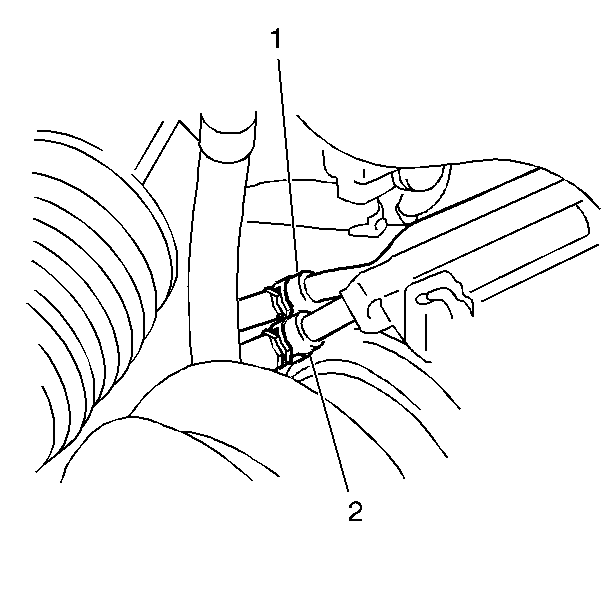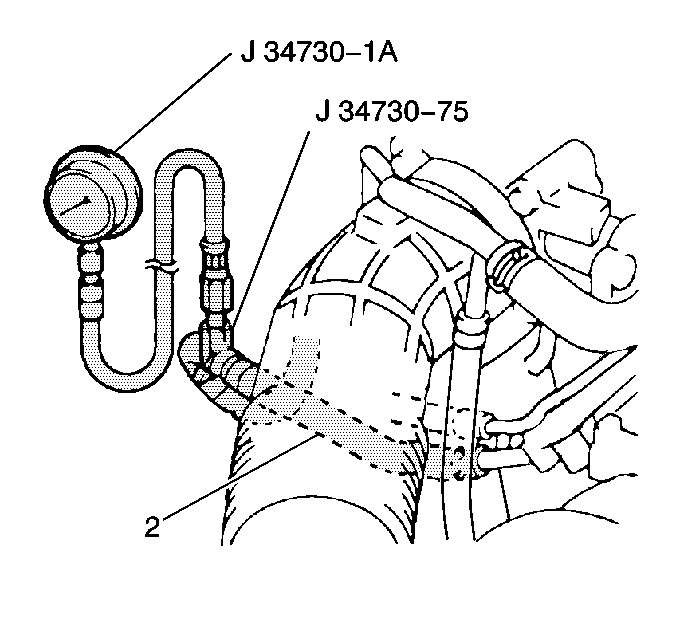Installation Procedure
Tools Required
- Relieve the fuel pressure. Refer to Fuel Pressure Relief Procedure
.

- Disconnect the fuel feed hose (2) from
the chassis fuel feed pipe. Use a shop towel in order to catch any remaining
fuel that may leak.

- Install the J 34730-75
Fuel Rail Adapter (1) to the chassis fuel feed pipe.
- Connect the fuel feed hose (2) to the J 34730-75
fuel rail adapter (1), and secure the hose with the hose clamp.
- Securely connect J 34730-1A
the
fuel pressure gauge (3) to J 34730-75
the fuel rail adapter (1).
Notice: Use the correct fastener in the correct location. Replacement fasteners
must be the correct part number for that application. Fasteners requiring
replacement or fasteners requiring the use of thread locking compound or sealant
are identified in the service procedure. Do not use paints, lubricants, or
corrosion inhibitors on fasteners or fastener joint surfaces unless specified.
These coatings affect fastener torque and joint clamping force and may damage
the fastener. Use the correct tightening sequence and specifications when
installing fasteners in order to avoid damage to parts and systems.
- Connect the negative battery cable.
Tighten
Tighten the negative battery cable retainer to 5.5 N·m (49 lb in).
- Start the engine.
- Idle the engine at normal operating temperature.
- Use the following procedure in order to check the fuel pressure:
| • | 200-240 kPa (28.5-34 psi) with the engine
idling. |
| • | 270-310 kPa (38.5-44 psi) with the engine
off and the ignition switch on. |
| • | The fuel pressure should remain at least 200 kPa (28.5 psi)
within 1 minute of key--off and the ignition switch on. |
- If the fuel pressure is not within the specification, refer to
Fuel System Diagnosis
.
Removal Procedure
- Relieve the fuel pressure. Refer to the Fuel Pressure Relief Procedure
.

- Remove theJ 34730-1A
fuel pressure gauge (3) and the J 34730-75
fuel rail adapter (1) from the fuel feed hose and from the pipe. Use a shop
towel in order to catch any remaining fuel that may leak.
- Connect the fuel feed hose to the chassis fuel feed pipe, and
secure the hose with a clamp.
Notice: Use the correct fastener in the correct location. Replacement fasteners
must be the correct part number for that application. Fasteners requiring
replacement or fasteners requiring the use of thread locking compound or sealant
are identified in the service procedure. Do not use paints, lubricants, or
corrosion inhibitors on fasteners or fastener joint surfaces unless specified.
These coatings affect fastener torque and joint clamping force and may damage
the fastener. Use the correct tightening sequence and specifications when
installing fasteners in order to avoid damage to parts and systems.
- Connect the negative battery cable.
Tighten
Tighten the negative battery cable retainer to 5.5 N·m (49 lb in).
- Turn ON the ignition in order to pressurize the fuel system.
- Turn OFF the ignition.
- Check for any fuel leaks.



